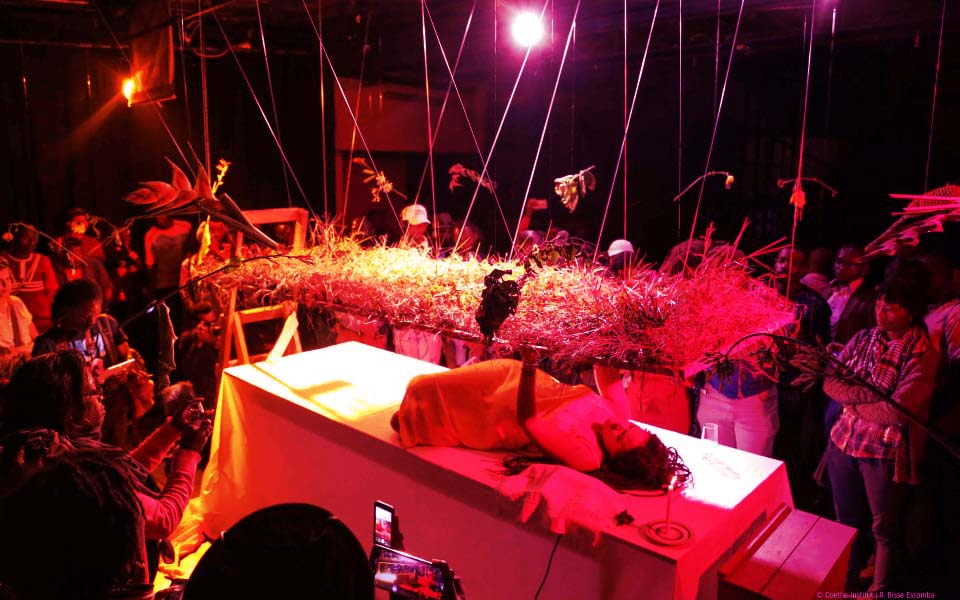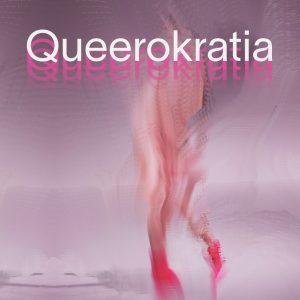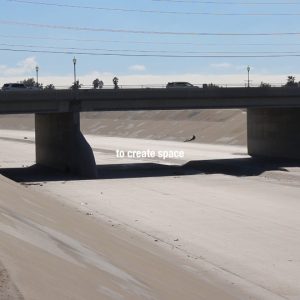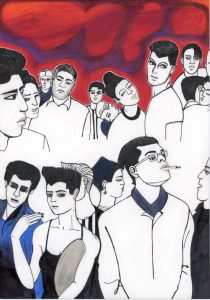Gespräch | Artist talk
Fr. 29.04.22 | 17:00 – 19:00
Artist talk from Wirya Budaghi
with Nathalie Anguezomo Mba Bikoro and Barış Seyitvan
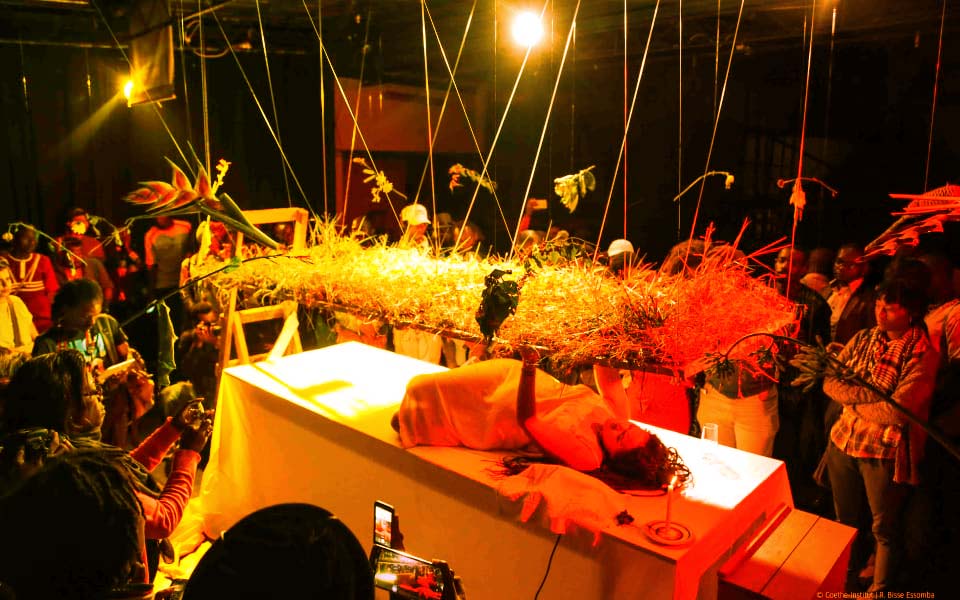
How can art create a process for reflection, practices of solidarity and togetherness, as well as for healing? How can art be a space for challenging history and building relationships with different struggles and their narratives, both in history and the present? How can art take hold on collective traumas?
Despite successful experiences in the history of art around the world, we witness an art system relying not on people, but rather on capitalism. A system that disclaims responsibility in order to achieve something which, in fact, is destructive to art: luxury and privilege within the capitalist system.
Today, times are critical. Therefore, we carry even more responsibility. In western countries, right-wing and nationalist groups have been organizing themselves and gaining popular support for decades. Here in Germany, we have witnessed terrible assassinations and terrors. Immigrants and refugees are not safe, not even in their homes and shops, and are brutally killed. We know that western art organizations and institutions did not pay enough or any attention to these issues, while, on the other hand, far-right groups strongly threaten social freedom. Why did most of these organizations and institutions remain silent in the face of this catastrophe? How do they position themselves in relation to it? How can social hope return to art? Where should we be critical with Knowledge? What knowledge and which experiences could help us rediscover art’s potential for a brighter horizon?
In english language
Wie kann Kunst einen Prozess der Reflexion, der Solidarität und des Miteinanders wie auch der Heilung schaffen? Wie kann Kunst zu einem Raum für die Auseinandersetzung mit der Geschichte werden, um sich zu vergangenen und gegenwärtigen Kämpfen und deren Narrativen in Bezug zu setzen? Wie greift Kunst auf kollektive Traumata zu?
Trotz weltweiter guter Beispiele in der Geschichte der Kunst sind wir gerade Zeugen eines Kunstsystems, in dessen Mittelpunkt nicht der Mensch, sondern der Kapitalismus steht. Ein System, das sich seiner Verantwortung entzieht und auf etwas abzielt, das zerstörerisch für die Kunst ist: Luxus und Privilegien innerhalb des kapitalistischen Systems.
Wir leben in kritischen Zeiten. Deshalb ist unsere Verantwortung heute umso größer. Seit Jahrzehnten gewinnen in der westlichen Welt rechte und nationalistische Gruppen an Zulauf. In Deutschland haben wir schreckliche Attentate und Terror erlebt. Einwander*innen und Flüchtlinge sind hier nicht einmal in ihren eigenen Wohnungen und Geschäften sicher, sie werden auf brutale Weise ermordet. Die westlichen Kunstorganisationen und -institutionen haben diesen Problemen, wie wir alle wissen, keine oder zu wenig Aufmerksamkeit geschenkt, während rechtsextreme Gruppen die gesellschaftliche Freiheit bedrohen. Warum haben die meisten dieser Organisationen und Institutionen angesichts dieser Katastrophe geschwiegen? Wie ist ihre Position dazu? Wie kann die Kunst wieder Hoffnung in die Gesellschaft bringen? Wo sollten wir Wissen kritisch sehen? Welches Wissen und welche Erfahrungen könnten uns helfen, das Potenzial der Kunst für einen helleren Horizont wiederzuentdecken?
In englischer Sprache
Nathalie Anguezomo Mba Bikoro’s work analyses processes of power and science fictions in historical archives that critically engage in migrational struggles and colonial memory, focusing on queer indigenous and Black feminist biopolitics central to the practice of ancestral healing. Anguezomo has developed frameworks of rituals and healing in performance work that often reveal the entangled colonial histories of migration at site-specific spaces to dismantle prejudices and build independent emancipatory tools for liberation, education & repair.
Anguezomo is artistic director of Squat Museum in Gabon (2008), a mobile museum and performing archive, and Nyabinghi_Lab Collective (2020; non-profit). Their work has been shown in numerous international exhibitions and Biennales including the Dak’art Biennale (2012, 2018), Venice Biennale (2016), La Otra Bienal, Bogota (2013), and RAVY Biennale, Yaoundé (2018).
www.angeuzomo-bikoro.com
Wirya Budaghi (artist name Wahshi Kuhi, born 1979 in Kurdistan, Iran) is a performance artist and activist who calls himself a “non-citizen”. Because of his creative practice, which for him is always also a political one, he had to flee Iran. Today he lives and works in Berlin. Wirya uses performance as a plat-form for collectivity among activists, artists and people. With his body he addresses state violence and military attacks, the right to mother tongue, migration, racism and colonial connections.
Kuhi’s work has been shown at Shanader Kurdistan Gallery, Iraq’s Arbil Academy of Fine Arts, Kave Refugee Camp in Erbil, Cornerhouse in Manchester, BIFPA 17 Belfast International Festival of Performance Art, SKALA Gallery in Poznan Nomadic Arts Festival in Poland, MPA-B in Acud and OKK, SOMA Gallery, SAVVY Contemporary and as part of the “about the museum” program at Gemäldegalerie Berlin.
Bariş Seyitvan is an independent Kurdish artist and curator from Diyarbakir, Turkey. His professional experience spans twenty years of work with arts organizations, individual artists and nonprofits. Seyitvan‘s focus is on contemporary art and migration in the Middle East. His work explores and reflects on the trans-national reality of the global Kurdish community. Seyitvan‘s exhibitions examine subjects that touch on history, geography and politics, as well as broader cultural themes of language, exile, gender and displacement, which have long dominated the Kurdish experience. Thereby he maintains relationships with a large number of Middle Eastern artists living in many parts of the world and organizes exhibitions in various cities around the world
Trauma – rechte Zukunft / deutsche Geschichte(n) ist ein Projekt des Instituts für Widerstand im Postfordismus und der Vierten Welt, gefördert durch die Senatsverwaltung für Kultur und Europa und dem Bezirksamt Friedrichshain- Kreuzberg.
Unterstützt durch Medienparterschaft taz die tageszeitung
Medienpartnerschaft:

